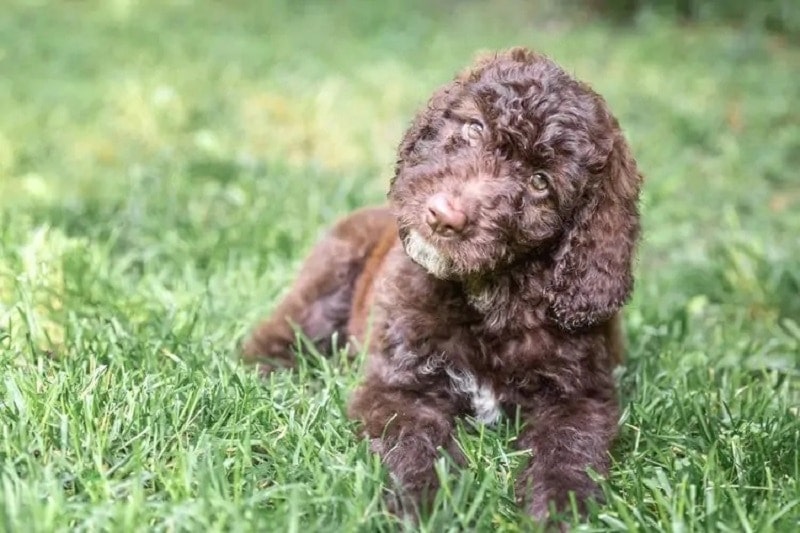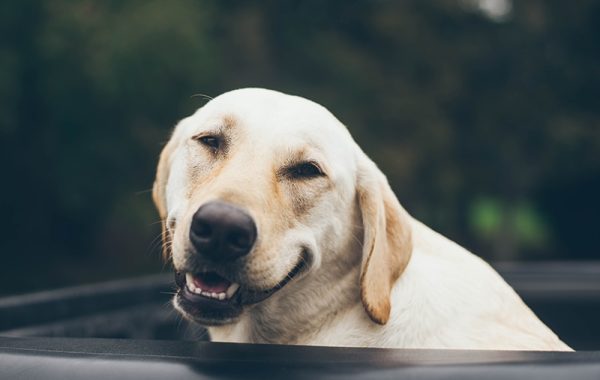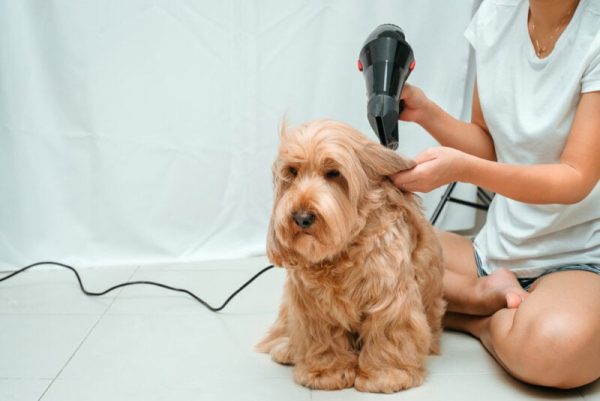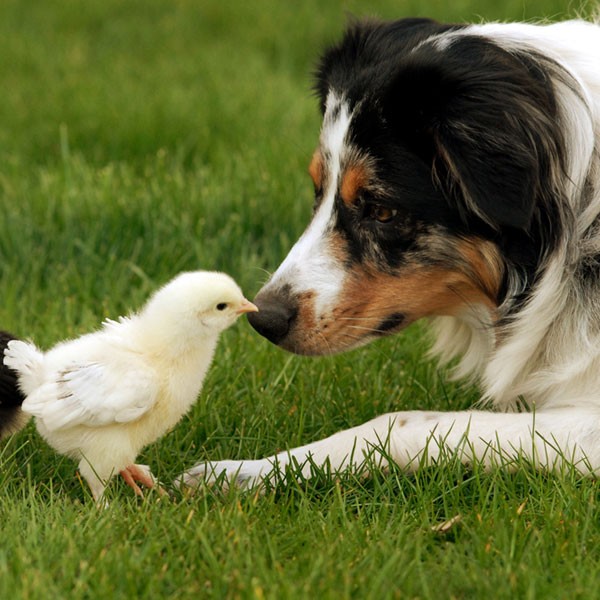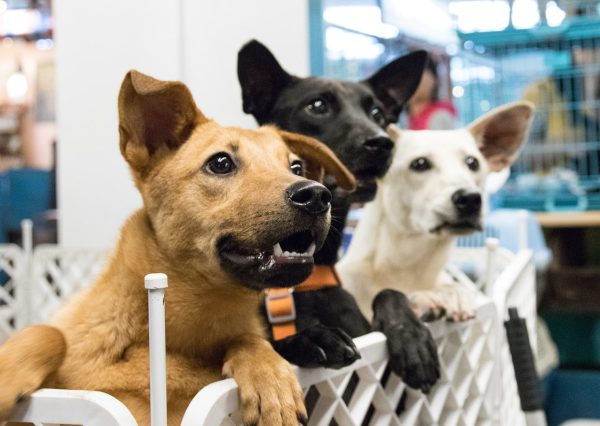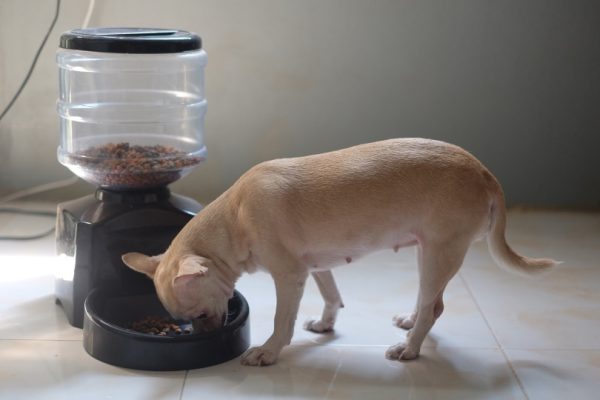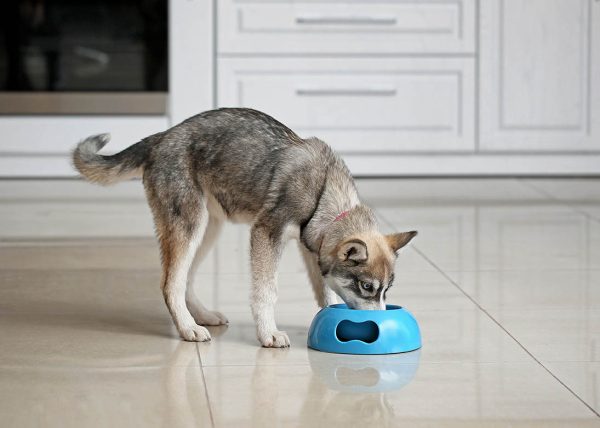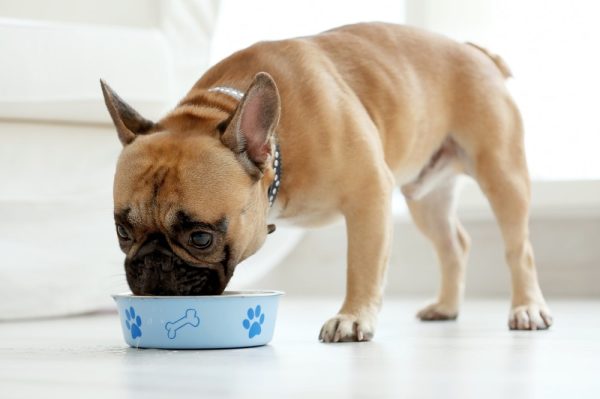In this article
View 8 More +This mixed breed is a cross between a German Shepherd and a Poodle. They are extremely intelligent, active dogs. They can make great pets for the right family, but they do need someone who can challenge their body and minds. They’re easy to train, though they can be a bit aloof with strangers.
They are affectionate with their family and extremely loyal. Often, they are well-manned indoors. However, they prefer to be outside with some sort of job to do. Many love canine sports and similar activities.
Breed Overview
Height
22–28 inches
Weight
50–90 pounds
Lifespan
10–18 years
Colors
Grey, brown, white, tan, black
Suitable for
Active families, those looking for a protective dog or exercise companion, owners with plenty of extra time
Temperament
Loyal, intelligent, active
They are usually considered large to medium dogs. It depends mostly on what traits the puppy inherits from which parents. Females are typically quite a bit smaller than males, though this isn’t always the case.
Because this is a mixed breed, you never know quite what you’re going to get. Puppies will randomly inherit traits from each parent. Therefore, you can end up with a dog with a wide range of different traits. Some may be more protective than others. They may have Poodle-like fur or just be a shaggy German Shepherd.
However, there are similar traits that all these dogs typically have. We look at those in this article, as well as outlier puppies that may act a bit differently.
Shepadoodle Characteristics

Shepadoodle Puppies

Shepadoodles are beautiful and unique dogs. It can be difficult to find breeders who specialize in this canine. Therefore, it can be challenging to find available Shepadoodle puppies. They may sometimes appear at local animal shelters and breed-specific rescues. Sometimes, accidental litters do end up at shelters, though. If you happen to find a litter of Shepadoodle puppies locally, consider yourself lucky.
When you bring a Shepadoodle home, be ready to give your dog plenty of exercise and mental stimulation since they are very energetic. They do great with kids because of their respectful nature and they create strong bonds with their owners.

Temperament & Intelligence of the Shepadoodle 🧠
The temperament and intelligence of the Shepadoodle depend largely on what traits the puppy inherits. However, all Shepadoodles will be energetic. They are active dogs that need quite a bit of exercise and mental stimulation. They require plenty of attention from their owners, so we only recommend them for families that have extra time on their hands. This is not a dog that you can leave in the yard for most of the day.
Larger families tend to be best suited to these dogs, as the extra family members can help keep the dog entertained and well-exercised.
These dogs may inherit the guarding tendencies from their German Shepherd parent. Early socialization is absolutely necessary to teach them that strangers aren’t necessarily bad. We recommend group puppy training classes, as these will provide your dog with both training and socialization.
Some dogs are extremely territorial and will need extensive training and socialization throughout their lives to be respectful of strangers, though they will never be friendly. Others will have their guarding instincts tempered by the Poodle parent, so they may be a bit friendly. Either way, these dogs don’t tend to seek out much attention from strangers. They’re more than happy to keep to their family most of the time. There are outliers, of course.
No matter where your dog falls on the scale, they need to be socialized. Puppies are often friendlier toward strangers than adults, so you may not realize the brunt of your dog’s guarding instincts until they hit sexual maturity. At this point, socialization will be more difficult and take longer. Starting it when they are puppies is a much better solution.
These dogs often bond closely with their family members. They are affectionate and loving toward just about everyone, including adults and children. They are happy to cuddle on the couch, though many prefer to run around and play with their family members instead.
Are These Dogs Good for Families? 🏡
Yes, as long as the family is active and has enough time to dedicate to this breed. The Shepadoodle needs quite a bit of attention. They have high exercise needs, require socialization, and need constant mental stimulation. This is difficult for busy families to achieve, which often leads to a frustrated and destructive dog.
If left to their own devices, these dogs will attempt to meet their needs by themselves.
Generally, these dogs do bond closely with all their family members and can get along well with children. They are big enough to deal with a child’s hyperactive behavior without getting injured, which limits fear-based biting. They also tend to be respectful of children and aren’t likely to knock them down.
Socialization is recommended if you plan on this dog being around children, as it is always best to get them used to a child’s usual behavior.
Does This Breed Get Along with Other Pets? 🐶 😽
They may be perfectly fine with other dogs, or they may be territorial. Many German Shepherds are best as the only dog in the household unless they were raised around the other dog. They can sometimes be fine if there is already another dog in the home when they are adopted, but many are not accepting of bringing a dog in later.
Some Shepadoodles may inherit this territorial behavior from their German Shepherd parent. Others will be more accepting of dogs, like their Poodle parent is. Getting your canine around many other dogs is your best bet, as they will learn that other dogs are generally not there to hurt them. Puppy training classes can achieve this easily because there are usually many different puppies in a class.
The Shepadoodle doesn’t have an extremely high chase instinct, but it is still typically present. Many may attempt to chase cats and other small animals, so they are generally not recommended in a home with small pets. Training doesn’t help much with this, as it is instinctual.
Things to Know When Owning a Shepadoodle
Food & Diet Requirements 🦴
The Shepadoodle often falls into the “large dog” category, though some dogs may be a bit smaller. For this reason, we recommend a food that is specifically formulated for large-breed dogs. Most dogs generally all have the same nutritional needs, but larger breeds benefit from specific nutrition to keep their joints healthy. Otherwise, their larger weight will make them more prone to joint problems later in life.
You should be especially careful when feeding puppy Shepadoodles. As a large breed, these canines are prone to hip dysplasia. This is partly genetic but it does have an environmental component. Typically, this condition occurs when the ball and socket of the hip joints don’t grow congruently. One grows faster than the other, which causes them not to line up. This causes excess wear and tear.
When the joint is finally done growing, there is often enough damage to prevent the hip from ever lining up again. The joint will continue to degenerate, leading to early arthritis, pain, and lameness.
Overfeeding puppies can make them more prone to this condition, as the extra calories can mess with their growth. A puppy food formulated for large-breed dogs is often recommended. Follow the instructions carefully. You should never free-feed these dogs, especially when they are puppies.
Exercise 🐕
This dog is a working breed, though they are largely kept as a companion animal. They need plenty of space to run off their energy. Access to a backyard is preferable, though these dogs can live fine in a home without one, as long as adventures are regularly on the schedule. These dogs are not suitable for an apartment, as their large size and exercise needs simply don’t allow them to adapt to small living quarters.
You should plan on taking your dog for long walks daily—and plan on spending plenty of time standing around while your dog sniffs. Smelling is like reading books for dogs; it is extremely mentally stimulating. Therefore, providing opportunities for them to sniff interesting things will wear these dogs out mentally as well.
These dogs thrive in most canine sports. Even if you don’t plan on competing, setting up an agility course in your backyard often provides your puppy with much-needed mental and physical exercise.
We only recommend this dog for active families due to their high energy needs. They take a great deal of work to keep happy, and this can be difficult for the average family to accomplish.
Training 🦮
These dogs are intelligent, so they require regular training and mental stimulation to stay happy. They can become bored easily, which leads to destructive behaviors. Training isn’t just about teaching this breed to behave, however; it works as a preventative tool toward bored, destructive behaviors.
On top of being intelligent, these dogs are loyal. They will readily listen to just about anything that their owner says, on top of learning new commands quickly. They are one of the easiest dogs to train for this reason. They typically don’t exhibit much stubbornness. If they do, it is usually around the time that they hit maturity. This is often jokingly called the “teenage” phase and only needs to be waited out.
While these dogs are usually easy to train, we still recommend professional training. Group classes are preferable because they also provide socialization with other dogs and people. Shepadoodles often exhibit protective behaviors, which can be difficult for an owner to control on their own. Unless you’ve previously trained a dog with serious protective instincts, we recommend utilizing a professional.
Socialization often turns these dogs into well-mannered canines. You should socialize them continuously, as it can wear off over time. Even if you took your dog everywhere as a puppy, it doesn’t mean they’ll still be accepting of strangers as an adult. Regular interactions with people and dogs are necessary into adulthood.
Grooming ✂️
Their grooming requirement will vary considerably. It depends on the traits that they inherit and what their coat ends up developing into. A puppy’s coat isn’t always an accurate representation of its coat after sexual maturity.
Either way, a Shepadoodle will likely need to be brushed every other day. If their coat is curly, this will prevent mats and help keep it clean. Brushing spreads the natural oils through the fur, which can help keep it healthy and prevent skin problems. For wiry-coat dogs, the brushing will remove dead hair and debris. No matter what coat they have, this regular brushing is necessary.
Dogs with longer coats may need to be brushed even more. If your dog seems to be matted even with regular brushing, increase the frequency of your grooming routine. Your dog’s coat may change as they age, so you may need to increase or decrease the amount of brushing when they get older. A slicker brush is often your best friend, as it is great at preventing tangles.
These dogs don’t tend to get dirty that often. However, they can “hold onto” smells, especially if they go swimming. For this reason, you should plan on bathing them regularly with a gentle soap. If your dog is smelly, it is absolutely time to bath them.
That said, you shouldn’t bathe them more than once every 2 months. More than this may upset their natural skin pH, which can cause all sorts of problems.
Health and Conditions ❤️
Generally, these dogs are healthy. As a mixed breed, they are less prone to the genetic conditions that purebreds often develop. There are simply more possible traits for them to inherit, which means they are far less likely to inherit any rare traits that cause health problems.
This doesn’t necessarily mean that they are completely healthy, though. They are prone to a few problems that owners should keep in mind.
The first of these is hip dysplasia. This is a serious condition that does have a genetic component, but it can also be caused by overfeeding and overexercising puppies. You should feed your dog carefully and never force them to exercise. Intense exercise is not recommended until after the dog is grown, as it can damage their joints otherwise.
Hip dysplasia is an expensive disease. Many dogs may be able to get away with monthly pain medications and supportive therapies. However, others will need surgery, which can potentially cost thousands of dollars.
Bloat is another common problem, which can be life-threatening if the dog does not undergo emergency surgery quickly. When a dog has bloat, their stomach fills up with gases. It may or may not twist. This eventually cuts off circulation to the stomach and other tissues as the stomach expands, eventually leading to necrosis. It does not go away on its own and leads to death relatively quickly.
The exact cause of this disease is unknown, but it is thought to have a genetic component because it is more common in certain breeds. Larger dogs seem more likely to get it, which includes the Shepadoodle.
- Pulmonic stenosis
- Seborrhea
- Diabetes
- Bloat
- Hip dysplasia
- Degenerative myelopathy
- Panosteitis

Males vs. Females
Usually, males are quite larger than females. This isn’t necessarily always the case, as the Shepadoodle’s size can vary quite a bit. However, males have a higher weight threshold, while females are generally lower. There is overlap between each sex and outlying dogs, of course.
Neither sex is more protective than the other. Males are not necessarily more aggressive or territorial, despite misconceptions. It depends much more on what traits the dog inherits from which parent. A female who inherits a German Shepherd’s protective instincts is more likely to be aggressive than a male who acts mostly like a Poodle.
In the end, you probably shouldn’t base your purchasing decision on sex. The differences simply aren’t big enough to matter in most cases. It mostly depends on your personal preferences.
3 Little-Known Facts About the Shepadoodle
1. They’re working dogs through and through.
These dogs are not made to sit around the house all day, even though they are mostly bred as companion animals. Both Poodles and German Shepherds are active working dogs. Therefore, their puppy will be extremely active and constantly look for a job to do.
2. A Shepadoodle may be aloof or sociable.
Depending on what traits these puppies inherit from their parent, they can either be protective or extremely friendly. Socialization is highly recommended for all puppies, as you won’t exactly know where your dog falls until later in life when socialization is less effective.
3. The type of Poodle matters.
Most of the time, the Shepadoodle is bred using a Standard Poodle. However, this isn’t always the case. The type of Poodle used has a huge impact on the size, so it is in your best interest to ask the breeder which kind of Poodle was used.

Conclusion
The Shepadoodle has the potential to be a great family dog. They are loyal and affectionate to their family members. Most are extremely easy to train and listen to their owners without much hesitation. Stubbornness is not common in this breed. They are even good with children due to their respectful nature and larger size.
However, they can be a bit of a handful. They will require plenty of exercise and mental stimulation. They are not a dog that can spend most of their day at home. Instead, many of them require regular interaction with their people, at least an hour of intense exercise, and multiple training sessions each day. That can be too much for the average family.
This dog is best suited for an active family that is looking for a full-time companion. Someone should be home with the dog on most occasions, or you should invest in doggie daycare. If you’re looking for a dog to lay nicely on the couch while you’re away working from 8 to 5, this isn’t the breed for you.
Featured Image Credit: Holly Michele, Shutterstock
